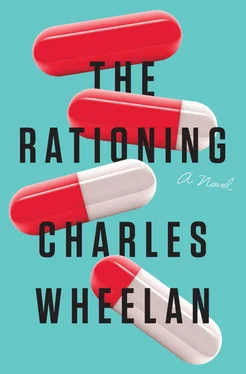This statement was both technically accurate and entirely misleading. The public had no conception of how serious a bad strain of influenza could be. Before the advent of Dormigen, a nasty global influenza outbreak could kill a million people, including tens of thousands in the United States. There were a few media references to the Spanish flu outbreak of 1918, one of the worst pandemics in modern history, but “the flu” was the image cemented in most minds. Ironically, most Americans still believed that Capellaviridae could be contracted via contact with other humans (like the flu), but the initial panic over the disease had subsided. Schools were open again and attendance at public events was drifting back toward normal. (The Washington Nationals stadium had been only about a quarter full during the spontaneous burst of patriotism in response to the President’s takeoff from Honolulu.) I watched the guys unloading bread for a few minutes and then retrieved my omelet when the microwave made its loud, annoying beep.
I do not want to overdramatize what happened next. I was hungry enough that I made short work of the omelet. I was getting up to make some toast when I got a text from Jenna. “Good sleep?” it said. I was elated to hear from her, and like anyone who has ever flirted by text, I carefully crafted my reply: “Excellent. Ice-cream cone later?”
I waited nervously for the response: “Definitely. See you at NIH?”
Jenna’s text had pushed that crazy German terrorist incident to the front of my mind. The ice-cream cone is what had made it so bizarre. What I realized explicitly as I sat at the dining room table was that the eccentric scientist was entirely protected as long as he was the only one who could procure the antidote. That was his innovation.
Other terrorists plant bombs and demand ransom, but the strategy has limitations. The bombs must be in a population center, which increases the likelihood that they are detected and defused. Or the area can be evacuated, rendering the bomb harmless (to people). Meanwhile, the terrorist is always at risk of being killed by the authorities; they do not need him alive to deactivate his explosive device. By introducing an unknown pathogen, however, the perpetrator guarantees his safety, particularly if the antidote is not commonly known. What was so surreal about the German scientist asking for his double-scoop ice-cream cone was his certainty that the authorities would not harm him. He could stash the antidote anywhere—in a safe-deposit box or buried in a public park—and the authorities would likely never find it if he were killed. In fact, we now know that the CEO, feverish and throwing up from his psychosomatic illness, was pleading with German authorities: “Do not kill him! I need him alive!”
These thoughts rushed through my mind as I sat at the dining room table. One can quibble with my analysis of terrorism, but that is not the point. My mind turned almost immediately to Capellaviridae and the North American dust mite. The most perfectly adapted species find some way to make themselves valuable to the broader ecosystem, thereby helping to ensure their own survival. Think about those little birds that perch inside the mouths of crocodiles and clean their huge, dangerous teeth. Everybody leaves happy. Evolution has a way of creating these synergistic relationships: bizarre creatures that interact in mutually beneficial ways. But what if nature had served up something different in the case of the dust mite, Capellaviridae , and humans? What if their relationship was something more akin to that of the German CEO and the mad scientist: extortion? Wouldn’t it be possible—and entirely consistent with everything we know about evolution—for one species to essentially hold another hostage? You continue to provide for my basic needs or I will kill you. Nature offers up innumerable examples of toxins and venoms wielded by bizarre creatures either to hunt prey or to protect themselves from predators. Couldn’t such weapons be wielded more creatively?
This rush of thoughts was not as clearly articulated as I have described them here. Rather, it felt like a half-formed idea engulfing my brain, like seeing an exam question that you know you can do but have not yet figured out. Or encountering a person you recognize in the street and searching your mind for her name. You know it’s coming . “It’s on the tip of my tongue!” my grandmother used to say (more and more as she got older, sadly). I was certain in that moment that the key to understanding lurking viruses was lodged in my subconscious, working its way toward somewhere else in my brain where I could put some form around it. I did have two concrete thoughts in the moment, however.
First, I had an example—admittedly hypothetical—that I would use repeatedly in the coming hours to make myself understandable. Imagine there is a venomous snake, I would tell the Chief of Staff and others. This snake leaves its hole in the ground in the day or night to hunt lizards, which it paralyzes with venom. But the danger of leaving the hole is that the snake exposes itself to predators, such as a hawk that can swoop down and grab the exposed serpent in its talons. There is a trade-off: the snake needs to hunt, but it exposes itself in doing so. This is standard Discovery Channel stuff.
Now let’s suppose that over the course of thousands of years, nature serves up a variation of that snake, a more “clever” species (if we are going to be anthropomorphic about it). This snake slithers into the hole of its prey, where scores of lizard eggs have just hatched. The “old” edition of this snake, the less “clever” one, would gobble up the baby lizards, enjoying one very fulfilling meal. Next week it will have to hunt all over again, once again exposing itself to all the predators aboveground. But the “clever” snake—again, somehow evolved over tens of thousands of years, maybe longer—finds a strategy that is nature’s equivalent of room service. Rather than eating the baby lizards in one glorious meal, the “clever” snake uses them to eat for a lifetime (or at least a couple of weeks); it holds them hostage, doing no harm as long as the adult lizards bring it food. This is nature’s equivalent of a guy who moves into your house, puts a gun to the dog’s head, and says, “No one gets hurt as long as you feed me well and do my laundry. Also, we’re going to need to order the premium cable channels.” (Remember, nature has no 911.) In my hypothetical “clever” snake example, both species derive an evolutionary advantage. The snake obviously benefits from getting fed without having to expose itself to predators; the lizards are also more successful as a species in the long run because: (1) the baby lizards do not get eaten; and (2) the snake interloper scares off other predators (e.g., other snakes).
As I have mentioned repeatedly, this example was entirely hypothetical. (When some jackass staffer at the National Security Council started asking me questions about whether lizards really live in holes, he was obviously missing the big picture.) The point is that I had developed a theory that could potentially explain the behavior of lurking viruses in a way that was entirely consistent with evolution. Why and how could the same virus live harmoniously with its host in some cases while causing serious illness or death in others? Perhaps it depends on whether the host is delivering what the virus needs to thrive. And if not… well, every once in a while you have to shoot a hostage to keep everyone in line. Or, in my hypothetical “clever” snake example, if the adult lizards stop bringing food, the baby lizards become dinner.
My second concrete thought as this amorphous theory surfaced in my brain was that I had to call Professor Huke. I was finally “thinking like a virus.” I was reasonably sure I had an answer worthy of one of his final exams, but I wanted to be sure before sending it up the scientific chain of command, let alone passing it along to the President of the United States. I found Huke’s home number in my phone and dialed. His wife answered promptly. “He’s off running errands,” she said.
Читать дальше












